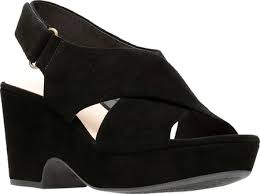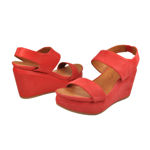John Fluevog:
A Review of
Two Fabulous High Heels
For Women Who Know They Can Wear Heels!
John Fluevog Hi Wedge Dawn
$159
Be still my heart!
I love John Fluevog shoes and I adore the look of the Hi Wedge Dawn.
I personally am on the verge of not being able to wear heels this high anymore because of the biomechanical structure of my foot
(mild Hallux Limitus with a slightly elevated 1st metatarsal and the beginning of a dorsal 1st metatarsal-medial cuneiform exostosis - but I digress...)
BUT
If you know that you can comfortably wear high heels, this is a good choice for comfort and style and I will be watching with admiration from the wings (in my lower heeled shoes).
*sigh*
John Fluevog Prepares Merit
$159
Perhaps it's the Aquarius in me,
but I totally dig this!
(Sorry, my seventies are showing...)
The heel takes a bit of getting used to but, once again, if you know that you can comfortably wear heels, this is another good choice for style and comfort. Because the heel height is lower than the Hi Wedge Dawn, this will be the better choice.
The Good, the Bad & the Fabulous...
What makes both of these shoes so comfortable is that they have a thick, rigid sole that allows no motion across the bottom of the foot,
which significantly decreases mechanical strain of the joints, tendons and muscles and allows for more comfort. Both heels have a wide and relatively soft toebox that allows for more accomodation of mild to possibly moderate bunions and hammertoes. They also have excellent midfoot and rearfoot control and, in the case of the Hi Wedge Dawn, excellent ankle control.
Anytime a shoe can 'lock in' the foot and ankle structures, you get more 'biomechanical control', which means:
*More Comfort
*Less Chance of Injury
*Less Wear and Tear of the foot structures
*Slowing the progression of foot problems such as bunions and hammertoes
*Less strain on the knee, hip and lower back
Am I saying that these heels better than wearing a good walking shoe?
No way.
But, if you are going to wear heels and you know can wear heels comfortably -
these are a good choice.
When it comes to wearing heels,
I always caution patients to listen to their bodies! If you are having any discomfort, then these are not the shoes for you.
If any shoe causes you pain - don't wear them. Pain is your bodies way of warning you of a problem.
If your shoes hurt, you are straining something and doing damage!
Remember, it's your feet against a lifetime of all the concrete in the world so, no matter what shoe you choose, try to choose a shoe with a these four things:
*Thick, rigid sole for more protection
*Arch Support
*Wide, soft toebox
*Rearfoot Control
Another thing to keep in mind is that
choosing the right shoe depends on the biomechanics of your feet.
That's what this blog is about.
For example, a rocker-bottom shoe is great for most people with plantar fasciitis (heel pain) but I would never recommend a rocker-bottom shoe for anyone with Achilles Tendonitis as it can cause the condition to worsen.
With that in mind...
The Hi Wedge Dawn Should Be Comfortable For Patients with:
*Mild Plantar Fasciitis (Heel Pain)
*Mild Hammertoes
*Mild Bunions
*Mild Achilles Tendonitis
*Maybe Mild Over-Pronators (Try wearing a dress orthotic specifically made for dress shoes to give you some arch support. Your health insurance might cover orthotics so ask your Podiatrist's office if they will check with your insurance to see if it is a covered benefit. If it is not a covered benefit, most Pod offices will carry an excellent OTC insert for dress shoes that are significantly less expensive).
The Prepares Merit Should Be Comfortable For Patients with:
*Mild Plantar Fasciitis
*Mild to possibly Moderate Bunions
*Mild to possibly Moderate Hammertoes
*Mild Achilles Tendonitis
*Mild Metatarsalgia
*Mild Morton's Neuroma
*Mild Forefoot Capsulitis
*Possibly Mild Sesmoiditis
*Mild Tendonitis
*Mild Tailor's Bunions
*Mild Corns & Calluses
*Mild to possibly Moderate Over-Pronators (try adding a custom-molded orthotic or over-the-counter insert made specifically for dress shoes or an less expensive over the counter dress insert for more arch control)
*Mild to possibly Moderate Hypermobility (add an insert if needed)
*Someone who has had a previous Lisfranc's Injury but is healed and having no pain (If unsure, check with your Podiatrist)
These Shoes are NOT Recommended for Patients with:
*Moderate to Severe Hallux Limitus (decreased range of motion of the 1st toe joint)
*Hallux Rigidus (No motion across the 1st toe joint)
*Severe Bunions
*Severe Hammertoes
*Degenerative Joint Disease
*Osteoarthritis
*Rheumatoid Arthritis
*Severe Over-Pronators
*Severe Ankle Instability
*Severe Hypermobility / Ligament Laxity
*Exostosis ("bumps" or "bone spurs" on the top of the midfoot area)
*Diabetics
*Peripheral Neuropathy (Nerve Damage)
*Peripheral Arterial Disease (Poor Circulation)
*History of Ulcerations or Open Sores
*Charcot Foot
*Weak Legs
*Moderate to Severe Knee, Hip & Lower Back Problems/Pain
*Balance Issues
*The Elderly
I hope this has been helpful and I thank you so much for reading!
Have a great weekend...
Dr. Cathleen A. McCarthy
:)
























